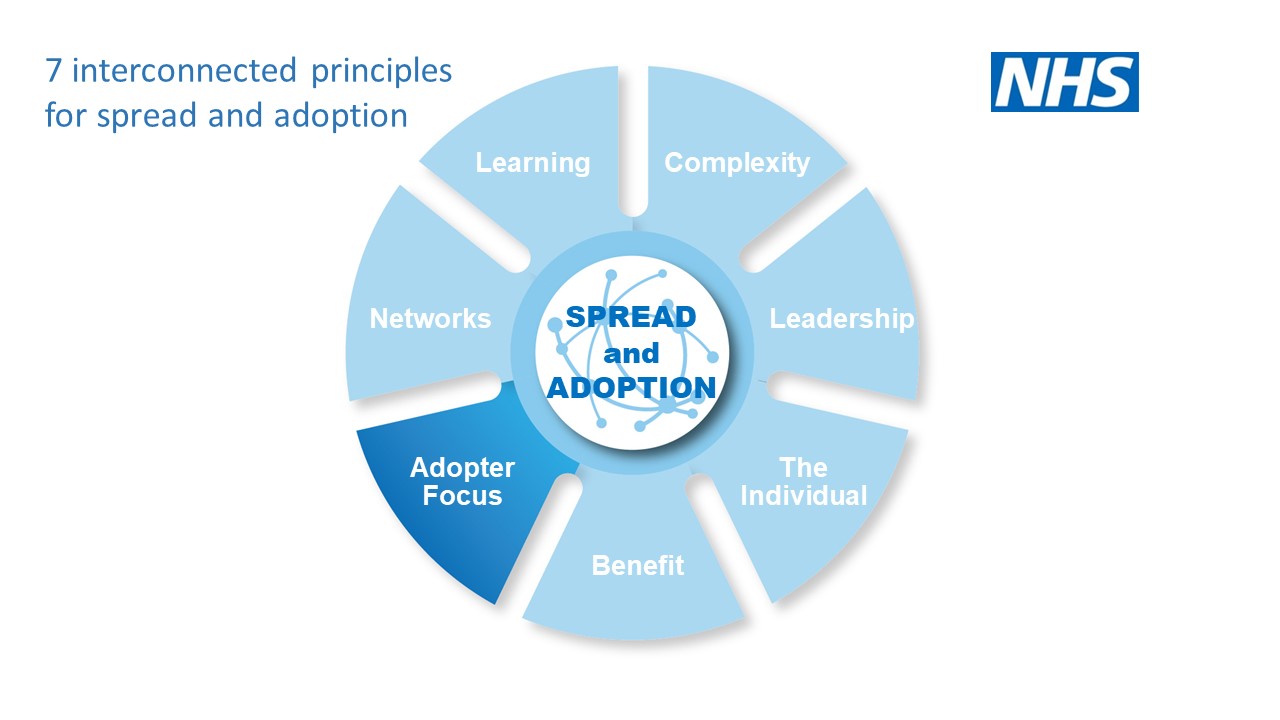The recently launched Guide, Leading the Spread and Adoption of Innovation and Improvement: A Practical Guide, offers seven interconnected principles. This blog is the fifth in a series of blogs, each focusing on one of the seven principles, and focuses on Adopter Focus.
These principles represent important aspects to consider for spread and adoption and are explained in the Guide. All the seven principles are important; they are interconnected, each will have a different importance and require different actions in different settings. Relational, interpersonal elements of spread and adoption – looking at how people can work together – is a common thread within each of the principles.

Increase the focus on the role of adopters to energise and spread through commitment and agency
The way an innovation is developed influences its subsequent adoption, spread and sustainability. Involving a wide range of people [and contexts] in the innovation development process maximises spread. Actively involve patients and carers as they can successfully innovate and facilitate spread of innovation e.g. Digibete.
- Early involvement of adopters in the development process increases commitment and ownership by developing 'investors' rather than 'buyers' of the innovation. Appreciate involvement too early may be in an innovation which does not deliver but involvement that is too late may lead to poor adoption and diminished learning opportunities.
- A more inclusive approach allows development of a network alongside the innovation. This network can enhance the innovation in both its development and in its acceptance and adoption [case study] and increase 2–way communication between innovators and adopters maximising learning.
- Maximise engagement and ownership to energise the adopter community and spread via commitment [Pull] not compliance [Push] harnessing individual and collective agency. See individual principle for more information.
- Adaptation is needed for complex innovations with multiple components and relational elements. Local adaptation and creativity is needed to respond to unique settings and may result in substantial refinement. When adapting consider unintended consequences, risk and check back to purpose. Adaptation increases understanding and confidence, speed of spread, makes the innovation come alive, creates ownership and embeds for sustainability. Therefore, what is needed is an innovation that can be adapted locally rather than a finished, inflexible product.
- Use in different contexts increases understanding of which aspects of the innovation should remain fixed [the core] and which can be adapted to the new setting [flexibility][see learning principle]. Gaining understanding of the innovation’s core and flexible elements, along with their interaction with different contexts, means an adopter can understand how to flex the innovation while remaining faithful to the core.
- Knowledge and experience on the ‘what’ and the ‘how’ gained from local adaptation by adopters, involving a wide range of contexts, and shared with innovators and the wider community produces an iterative shared, co-created narrative
- Plan for spread considering the innovation and its stage of development, approach and context and consider how the innovation will be sustained.
More information on adopter focus can be found in adopter focus principle and in further resources.

Image by Gerd Altmann from Pixabay
Applying This Principle To Practice
The Guide offers a list of questions to help apply this work to practice. The questions will be of varying relevance depending on the particular context. Some of the questions are:
- Who do you need to involve in your work? When do you need to involve them? How do you involve them and what is their role?
- How can the adopter community be energised to create a pull for innovations?
- How can you adapt your messages so the adopters find them energising?
- What is the level of understanding of complexity and the need for local adaptation and how can this be increased?
- How is learning on local adaption captured and shared?
- How are unintended consequences used to inform learning?
- How does your spread and adoption plan incorporate sustainability of the innovation?
You may find the following tools and methods helpful:
- Stakeholder mapping
- Personas
- Accelerated Design Event (ADE)
- Social media including crowdsourcing and tweet chats
also see practical tools and methods, further resources and systems convening sections in the Guide.
These seven interconnected principles can be used by individuals, or by a team, and at all levels; local, regional and national and settings where the spread and adoption of complex change is needed. These principles can be used to inform planning and to inform ongoing reviews.
This blog Introduction to the Seven Interconnected Principles for Spread and Adoption offers an overview of all seven principles.
Details of how these principles apply to the work we do are described in How the Seven Spread and Adoption Principles Work in Practice: the Continuing Healthcare Improvement Collaborative case study.
Want More Information?
More details on the Adopter focus principle is in the Guide here and in the further resources – change section.
More information on the seven spread and adoption principles and system convening, including blogs and videos, is available on the NHS Horizons website.
If you're interested to read more there are previous blogs and further blogs to follow. Please do subscribe to this blog and follow @DianeKetley @HorizonsNHS, #NHSSpread.
We would love to hear your feedback about the Guide, and how you will use it. Send a tweet to @DianeKetley @HorizonsNHS #NHSSpread. If you prefer email, get in touch at England.si-horizons@nhs.net.
Image by Gerd Altmann from Pixabay



/Passle/5a5c5fb12a1ea2042466f05f/MediaLibrary/Images/6168334917af5b10f4bf1d30/2022-04-14-15-27-52-040-62583d78f636e9115805b2d5.png)
/Passle/5a5c5fb12a1ea2042466f05f/MediaLibrary/Images/6168334917af5b10f4bf1d30/2022-08-05-09-59-36-465-62ecea08f636e906acfed639.jpg)
/Passle/5a5c5fb12a1ea2042466f05f/MediaLibrary/Images/6168334917af5b10f4bf1d30/2022-07-28-14-57-17-405-62e2a3cdf636e9180c9835cb.png)
/Passle/5a5c5fb12a1ea2042466f05f/MediaLibrary/Images/6168334917af5b10f4bf1d30/2022-07-20-10-16-56-533-62d7d618f636ea07987f6668.png)
/Passle/5a5c5fb12a1ea2042466f05f/MediaLibrary/Images/6168334917af5b10f4bf1d30/2022-07-15-09-55-32-858-62d13994f636ea1398e71aa9.jpg)